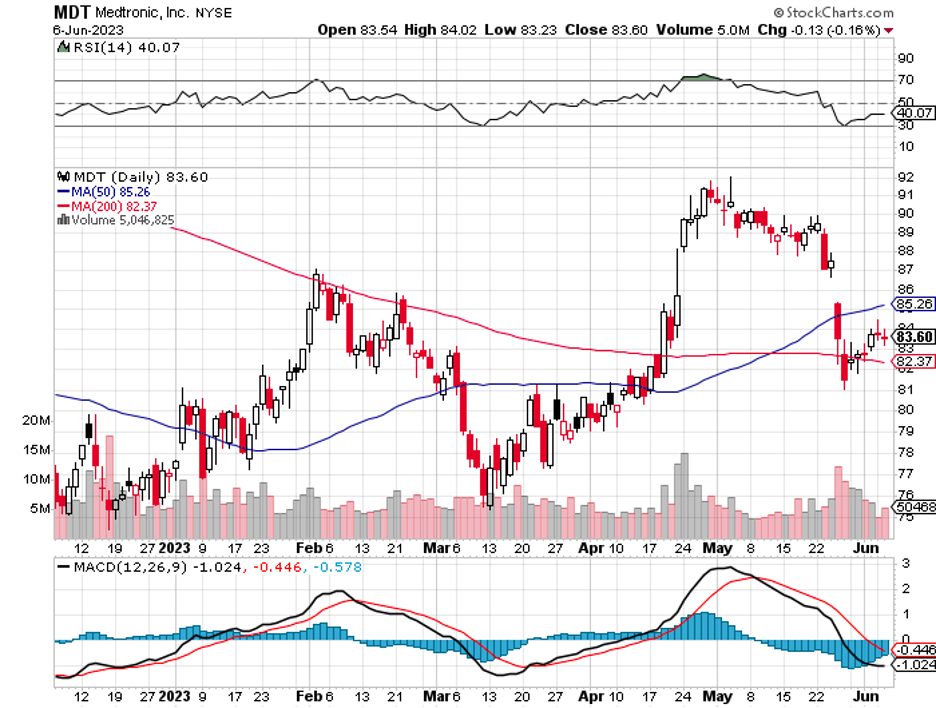The AI Infusion
Curious about the true potential of AI to drive earnings growth in the healthcare industry?
Let me paint you a picture of how AI's transformative power is set to revolutionize medical products and services. Imagine cutting-edge devices that can detect diseases at their earliest stages, leading to increased adoption by healthcare facilities.
And what does that mean for the companies behind these remarkable tools? More revenue, of course.
It is no surprise that experts predict exponential growth for AI in the healthcare market. This sector is projected to skyrocket at a compound annual growth rate of 47%, reaching a staggering $100 billion by 2030.
One company that has embraced this inevitable shift is Medtronic (MDT), a leading player in the medical device industry.
With a robust portfolio of innovative products, Medtronic has witnessed steady revenue growth over the years.
In fact, in its most recent fiscal year, the company invested a whopping $2.7 billion, equivalent to 8.6% of its sales, in research and development (R&D) to fund over 200 clinical trials. These trials cover a wide range of medical conditions, from diabetes management to a host of other ailments.
Thanks to its extensive product lineup, this Ireland-based medical device giant impacts the lives of approximately 76 million patients annually.
In recent times, however, Medtronic has faced a significant challenge: a lack of substantial growth. Hence, the company has taken decisive measures to address this issue by streamlining its operations and making strategic acquisitions to unlock future revenue potential.
This is undoubtedly encouraging news. But there's an additional factor that has everyone buzzing with excitement these days: artificial intelligence (AI).
Thus far, Medtronic has successfully implemented AI across its diverse platforms, revolutionizing how it caters to patients, from delivering precise insulin dosages to individuals using their continuous glucose monitoring systems to refining the outcomes of intricate spinal surgeries.
The company's endeavors in the field of AI have even garnered accolades.
Actually, Medtronic's groundbreaking AccuRhythm AI algorithm technology recently secured the prestigious "best new monitoring solution" award from MedTech Breakthrough. This remarkable innovation significantly enhances the quality of data derived from cardiac monitors, benefiting individuals with abnormal heart rhythms.
Moreover, Medtronic recently forged a partnership with NVIDIA (NVDA).
This collaboration aims to enhance the capabilities of Medtronic's GI Genius endoscopy tool, which already employs AI to detect pre-cancerous tissue.
By enabling third-party developers to train and test AI models that could eventually be integrated into the GI Genius, this strategic alliance holds immense potential for future advancements in the field.
Recognizing the transformative impact of AI, Medtronic envisions it as a pivotal element in the future of healthcare. The company considers AI to be the linchpin of personalized medicine, and this belief holds considerable merit.
Evidently, AI's remarkable capacity to predict and anticipate medical issues or outcomes on an individualized basis aligns seamlessly with the very essence of personalized medicine.
Naturally, Medtronic isn't the sole player in this groundbreaking realm of investment.
Take, for instance, GE Healthcare (GEHC), which recently obtained approval for its revolutionary deep-learning technology aimed at enhancing PET/CT scan images. Major pharmaceutical giants like Eli Lilly (LLY) have also joined forces with AI technology companies to expedite their drug-discovery endeavors.
When you consider the extensive integration of AI within Medtronic's operations, though, the company emerges as a frontrunner in this field. Its AI initiatives have already contributed to notable growth in specific sectors.
Just look at its gastrointestinal (GI) business, which experienced a remarkable 16% increase in the latest quarter, thanks to the strong adoption of the innovative GI Genius technology. Additionally, Medtronic's neuroscience division, encompassing its spine surgery products, witnessed a respectable 6% growth.
This success story doesn't end there.
With its recent dividend increase marking the 46th consecutive year of such a move, Medtronic is on the verge of achieving Dividend King status.
What's even more enticing is the current valuation of Medtronic's stock, trading at a modest 16 times forward-earnings estimates. This presents a compelling opportunity for investors, considering the company's significant advantages.
For one, even if overall growth may not be skyrocketing at the moment, Medtronic continues to generate impressive billion-dollar earnings. On top of that, and perhaps most intriguingly, Medtronic has positioned itself at the forefront of a potentially game-changing new market.
Taking all of this into account, there has never been a better time to consider investing in Medtronic. I suggest you buy the dip.

